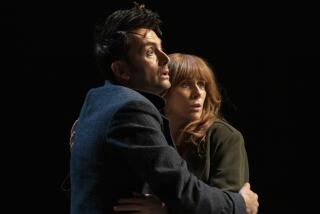Review: ‘Sherlock: The Abominable Bride’: Cumberbatch and Freeman go Victorian for classic Holmes and Watson
- Share via
After nearly two years away, “Sherlock” returned to television with a New Year’s Day special broadcast more or less simultaneously on PBS and the BBC. (PBS will re-air the 90-minute episode Jan. 10, and it will run in theaters nationwide Jan. 5 and 6.) Three more episodes, a full-fledged fourth season, will go into production this year.
It was known in advance that this edition of Steven Moffat and Mark Gatiss’ 21st century take on Sherlock Holmes would revert to the time of Arthur Conan Doyle’s original — that Sherlock and John, as familiarly portrayed by Benedict Cumberbatch and Martin Freeman, would as it were, play the classic Holmes and Watson, with the pipe and the tweeds and all the Victorian trimmings and harrumphings.
Whether “Sherlock: The Abominable Bride” would be just a jolly holiday experiment, or something to do with the rest of the series was unclear, even to reviewers, who watched with everyone else. If it felt written backward at times — an elaborate justification of a simple inspiration, to put the characters in their traditional costumes — it moved fast enough to stay fun while it happened. Cumberbatch, especially, has taken the possession of his part so successfully that his upturned collar now feels as much a Holmesean signature as a deerstalker cap.
The special began with clips from earlier seasons, concluding with Sherlock’s brief flight from and return to British soil — where we left him, in February 2014 — before proceeding, “alternatively” as a title card offers, into the past. It replayed the meeting of Holmes and Watson (popularly held to be New Year’s Day, 1881) in 19th century terms, before embarking on what at first seemed a straightforward pulp adventure, involving “suicide as street theater, murder by corpse,” a ghost story for Christmas.
Mrs. Hudson complains to Watson about her fictional counterpart, “According to you I just show people up the stairs and serve you breakfast....I’m your landlady not a plot device.”
— Robert Lloyd
That it would join with the series’ overarching narrative wasn’t obvious at first, but was announced slyly, if clearly, with a slip of a pronoun here and a chronologically anomalous phrase there, upon which the story split into two (to start) and turned to face itself as if from both sides of a mirror. I hope that is not too spoilery for you.
Holmes is such a familiar figure that, apart from straightforward adaptations of original stories — and the last television series to do that, starring Jeremy Brett, ended more than 20 years ago — every use of Holmes is also a comment on the characters and their habits and accessories. But even Conan Doyle’s originals had a meta-fictional element, existing as literature, written by Watson, within the world of the characters: “Honestly, I cannot congratulate you upon it,” Holmes says to Watson in “Sign of the Four,” when asked whether he’s read “A Study in Scarlet.” “You have attempted to tinge it with romanticism, which produces much the same effect as if you worked a love-story or an elopement into the fifth proposition of Euclid.” But this episode, in which fictions imagine fictions to reflect upon fictions’ fictions, put the meta front and center.
Join the conversation on Facebook >>
A feminist theme worked its way through the story, from small jokes — as when Mrs. Hudson complains to Watson about her fictional counterpart, “According to you I just show people up the stairs and serve you breakfast. ... I’m your landlady, not a plot device” — to the very solution to the crime. It felt a little insistent, but as a corrective to earlier plot points, as when Holmes romanced a woman to gain access to her employer’s files, also overdue.
Like an episode of “Doctor Who,” a series Moffat also shepherds, it was fulfilling or frustrating according to what you watch for and what kind of consistency you require.
“Poetry or truth?” Sherlock asks at one point, a question that almost seems self-reflexive on the writers’ part; Moffat, especially, can opt for the former at the expense of the latter. Though it contains some elements from Conan Doyle’s “The Five Orange Pips” and brief nods to other stories, “Bride” is not an adaptation but rather a working through of ideas and events from the series itself — processed, as in dreams, by Holmes in his “mind palace,” a conceit that lets Moffat and Gatiss externalize his thinking, but which also lets the action run into parallel courses and chronologies and anywhere it damn well pleases.
On Twitter: @LATimesTVLloyd
MORE TV REVIEWS
‘Cooper Barrett’s Guide to Surviving Life’ slowly matures beyond the bro-fest
‘Downton Abbey’ gears up for a grand old-fashioned finale as a new age dawns
Review: Shallow ‘Bordertown,’ from the Seth MacFarlane show factory, fails to sting
More to Read
The complete guide to home viewing
Get Screen Gab for everything about the TV shows and streaming movies everyone’s talking about.
You may occasionally receive promotional content from the Los Angeles Times.







